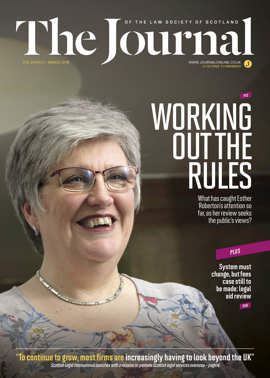Public policy highlights
The Society’s policy committees have had a busy month analysing and responding to proposed changes in the law. Key areas are highlighted below. For more information see www.lawscot.org.uk
Brexit
The Constitutional Law Committee responded to the UK Government’s policy paper outlining the position on cross-border civil judicial co-operation in the future partnership with the EU. Within the EU, there is an almost complete legal framework for choice of law, jurisdiction and recognition and enforcement of judgments in civil and commercial matters. This aims to facilitate the recognition and enforcement of judgments by member states’ courts, to achieve free movement of judgments and rules for jurisdiction and choice of law, and to provide common rules of evidence and service of documents. All of these are important in cross-border matters and will continue to be relevant after the UK has left the EU.
The committee believes that the UK and EU will need to agree continued participation in the existing arrangements or develop alternative means of judicial co-operation across Europe. The UK could negotiate to include the Brussels rules on recognition and enforcement in the post-exit agreement with the EU. This could also include the Service of Documents and Taking of Evidence Regulations.
Suggested amendments to the Taxation (Cross-border Trade) and Trade Bills were also produced ahead of report stage in the House of Commons.
Policing and criminal justice
The Criminal Law Committee submitted written evidence to the Scottish Parliament’s Justice Committee on the implications of Brexit on policing and criminal justice in Scotland.
Key issues to be considered in relation to future agreement with the EU post-Brexit, include stability in the law for the public and those who are required to advise on such matters. The UK Government has urged the closest possible continued co-operation with the EU, which must be maintained and strengthened to deal with the issues that may arise in relation to policing and the criminal justice system. This is crucial when addressing terrorism and organised crime, which pose continuing threats to the EU, the UK and Scotland.
There will be an impact on Scotland post-withdrawal, given its unique legal system. In discussing the scope of criminal justice, the Scottish legal profession, court structures and procedure, and prosecution and police force are all relevant. Significant questions will therefore arise as to how criminal justice, policing, law enforcement and security will be dealt with post-exit.
Forestry and land management
The Rural Affairs Committee issued a briefing to all MSPs ahead of the stage 3 debate on the Forestry and Land Management (Scotland) Bill on 1 March.
It noted that further action will be required in order to complete the devolution of forestry. First, orders will be required under the Scotland Act 1998, for example to wind up the Forestry Commissioners as a cross-border public authority, and secondly, new organisational arrangements will be required in order to transfer the activities presently delivered by the commissioners in Scotland to the Scottish Government.
The policy justifications of the bill are improved accountability, transparency and policy alignment; modernisation; and more effective use of Scotland’s publicly-owned land. The committee welcomed legislation capable of delivering on these objectives. The public should have greater access to the benefits of publicly owned land, including the National Forest Estate, as well as information about that land. It is important that the public are able to benefit from the changes proposed.
Planning (Scotland) Bill
The Planning Law Committee submitted written evidence to the Scottish Parliament’s Local Government & Communities Committee on the Planning (Scotland) Bill.
As with the Planning etc (Scotland) Act 2006, the current bill takes the form of amending legislation. Throughout the bill, there are multiple amendments to the same sections. As a result, the bill is difficult to follow and the committee considers this to be contrary to the intention to involve the public in both the consultation and planning process.
The bill is of a skeletal nature, with much detail to be set out in regulations. This makes it difficult to understand the full impacts of what is proposed. In key areas, particularly the scope of the gate-check provisions, the relationship between the National Planning Framework and local development plans, and the proposed infrastructure levy, there is insufficient clarity on how the new system will operate. This lack of clarity may be a disincentive to investors and developments.
The Policy team can be contacted on any of the matters above at policy@lawscot.org.uk Twitter: @lawscotIn this issue
- Borrowings, partner capital and profitability
- GDPR and the cloud
- Employment claims: is the flood still to come?
- Contributory fault: drivers, cyclists and pedestrians
- Reading for pleasure
- Opinion: Derek McCabe
- Book reviews
- Profile: Siobhan Kahmann
- President's column
- Application changes coming
- People on the move
- Seeking a better way
- Beyond borders
- Drawings and profitability
- Enforceable rights or progressive policy goals?
- Conflict theory: it works
- What the liquidators don't tell you
- The office on the move
- Please can we have some more?
- Health check for doctors' lines
- When creditors come first
- Keeping goods exclusive
- Tenant Farming Commissioner: the story so far
- HSE appeals: experts allowed in
- Scottish Solicitors' Discipline Tribunal
- Please don't stop the music
- Broadcasting's business end
- Public policy highlights
- Scam warnings escalate
- This time it's personal
- The game's not a bogey!
- "Only amateurs attack machines; professionals target people"
- When estate agents need client ID
- Banks, client accounts and the Money Laundering Regulations
- Third party rights: what now?
- Ask Ash






